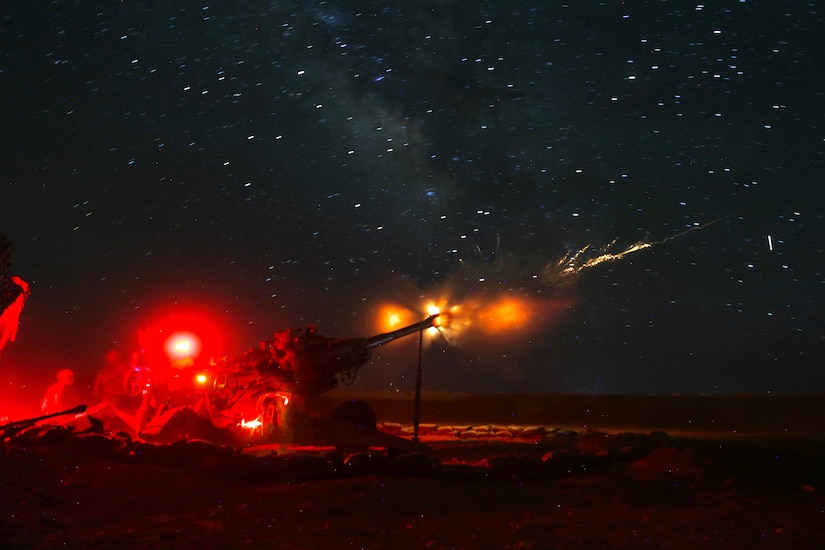SOUTHWEST ASIA -- Combined Joint Task Force Operation
Inherent Resolve and its partners have increased offensive activity against
Islamic State of Iraq and Syria targets in designated parts of Iraq and Syria
throughout the months of May and June.
Since the May 1 start of Operation Roundup, Syrian
Democratic Forces resumed major offensive operations in the Middle Euphrates
River Valley. Since then, the SDF has continued to gain ground through
offensive operations coupled with precision coalition strike support.
Combined Joint Task Force Operation Inherent Resolve and its
partner forces continue to exert pressure on ISIS senior leaders and associates
in order to degrade, disrupt and dismantle ISIS structures and remove
terrorists throughout Iraq and Syria. ISIS morale is sinking on the frontlines
as privileged ISIS leaders increasingly abandon their own fighters on the
battlefield, taking resources with them as they flee.
Over the coming weeks, Operation Roundup will continue to
build momentum against ISIS remnants remaining in the Iraq-Syria border region
and the middle Euphrates River Valley. The coalition remains committed to the
lasting defeat of ISIS here, increasing peace and stability in the region and
protecting all our homelands from the ISIS threat.
Coalition military forces conducted 26 strikes June 11-17,
consisting of 36 engagements in Iraq and Syria.
Strikes in Syria
On June 17 near Shadaddi, coalition military forces
conducted a strike consisting of two engagements against ISIS targets, destroying
two ISIS fighting positions.
On June 16 near Abu Kamal, coalition military forces
conducted three strikes consisting of three engagements against ISIS targets,
destroying two ISIS supply routes.
On June 15, coalition military forces conducted three strikes
consisting of three engagements against ISIS targets. Near Abu Kamal, a strike
engaged an ISIS tactical unit and destroyed an ISIS vehicle. Near Shadaddi, two
strikes engaged an ISIS tactical unit, destroying an ISIS vehicle and an ISIS
anti-air artillery system.
On June 14, coalition military forces conducted two strikes
consisting of two engagements against ISIS targets. Near Abu Kamal, a strike
destroyed an ISIS-held building. Near Shadaddi, a strike destroyed an ISIS
logistics hub and an ISIS fighting position.
On June 13, coalition military forces conducted seven
strikes consisting of seven engagements against ISIS targets. Near Abu Kamal,
four strikes destroyed two ISIS vehicles, an ISIS supply route and damaged an
ISIS vehicle. Near Shadaddi, three strikes engaged an ISIS tactical unit,
destroying an ISIS tactical vehicle, an ISIS line of communication and an ISIS
headquarters.
On June 12, coalition military forces conducted four strikes
consisting of 10 engagements against ISIS targets. Near Abu Kamal, a strike
engaged an ISIS tactical unit. Near Shadaddi, three strikes engaged an ISIS
tactical unit, destroying two ISIS fighting positions and three ISIS lines of
communication.
On June 11 near Abu Kamal, coalition military forces
conducted three strikes consisting of three engagements against ISIS targets,
destroying three ISIS supply routes.
Strikes in Iraq
There were no reported strikes conducted in Iraq on June
15-17.
On June 14, coalition military forces conducted two strikes
consisting of four engagements against ISIS targets. Near Basheer, a strike
engaged an ISIS tactical unit and destroyed seven ISIS-held buildings. Near
Rutbah, a strike engaged an ISIS tactical unit.
There were no reported strikes conducted in Iraq on June 13.
On June 12 near Basheer, coalition military forces conducted
a strike consisting of two engagements against ISIS targets, destroying two
ISIS tunnels and an ISIS supply cache.
There were no reported strikes conducted in Iraq on June 11.
Definition of Strikes
This coalition strike release contains all strikes conducted
by fighter, attack, bomber, rotary-wing or remotely piloted aircraft,
rocket-propelled artillery and ground-based tactical artillery.
A strike, as defined by coalition officials, refers to one
or more kinetic engagements that occur in roughly the same geographic location
to produce a single, sometimes cumulative effect in that location. For example,
a single aircraft delivering a single weapon against a lone ISIS vehicle is one
strike, but so is multiple aircraft delivering dozens of weapons against a
group of ISIS-held buildings and weapon systems in a compound, having the
cumulative effect of making that facility harder or impossible to use. Strike
assessments are based on initial reports and may be refined.
Task force officials do not report the number or type of
aircraft employed in a strike, the number of munitions dropped in each strike,
or the number of individual munition impact points against a target.







No comments:
Post a Comment